#literature analysis
Text
Critical Role's Cameraman
So, Critical Role (@criticalrole) just released their newest opening title sequence, an animated sequence in the same style of Your Turn To Roll and I would be remis as a film nerd to not pick apart every detail.
What fascinates me about this introduction, however, is the camera movement and shot composition. Allow me to explain.
I DONT THINK THERE ARE SPOILERS AHEAD, BUT JUST TO BE SAFE

So, we open with a hand, this is a close up, I don't think that is unobvious.
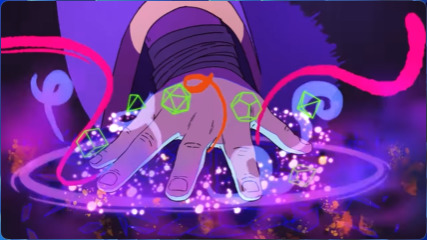
But this stops being a close up rather quickly, before it starts moving away. The shot just gives the hand context, and suddenly you aren't in an extreme close up of a hand, you are in a medium shot of a very large person. Then the camera pans backwards, and you can see villains and places spring up, although the perspective on Matt remains weird. Is he a few metres from you, or a hundred? How big is the Game Master here? There's a sense of mystery, of incomprehension. This is setting up some cosmic horror shenaniganry.

Then, we get Fearne. This is a wide camera motion, swivelling around her in a tracking shot that focuses on her face, and those eyes. It is like a reverse panorama, where Fearne is taking in the world, the world is observing Fearne.
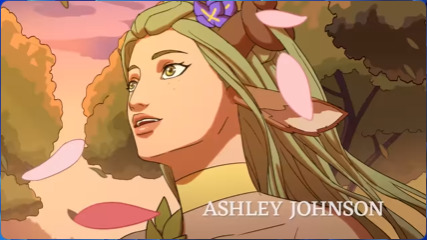
But I want you to take note of the leaves here, because they are used to form a connection between her and Orym. The transition uses them, while it isn't a direct wipe transition (the leaf just flies close to mask an abrupt cut), it is framed as one. The name of that isn't important, though, what's important is the leaves. By being in both shots, they emphasise the relationship between the two characters. But where for Fearn they show off her sense of wonder, for Orym, they take on a very different meaning.
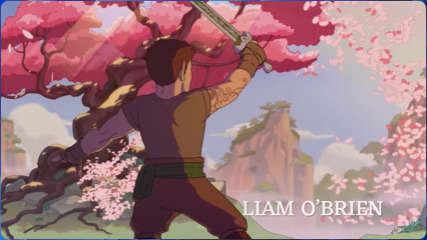
Notice, however, how still this shot is. There is no sense of danger here. This is a scene of a warrior with a sword and two people passing on from this world. But it's calm. Because this is a memory. Orym might not be at peace with the death, but the memory isn't a violent one, it's a memory of his family's lives.
Cut to a close up. Orym creates a gust of wind.
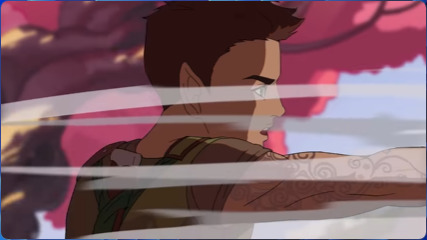
And cut to the next shot.
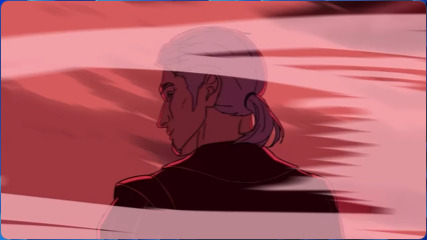
I will not lie, Bertrand is my favourite character across all of Critical Role, so this shot of him made me smile, but it isn't the point here. The point is Imogen's introduction.
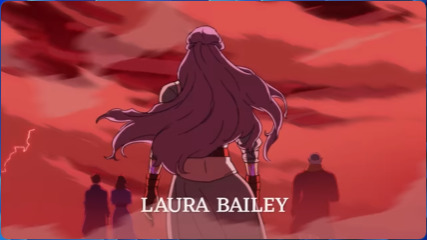
Although is Bertrand not actually the point? Because take a look at how Imogen is shown here. Do you notice anything?
She's shown in the exact same way. Imogen is shown doing the exact same thing that those who have died have done. And she can see them ahead of her. The camera panning back shows a wider perspective here, showing her as she tries to run, tries to get away from the same path as Bertrand.
The wind from Orym's blade that came to this scene gets across a consistent element: Memory. This is a dream. But dreams can become nightmares.
As Imogen loses her footing, the camera gives some of its wildest movements yet. It tumbles around her, then looks up.
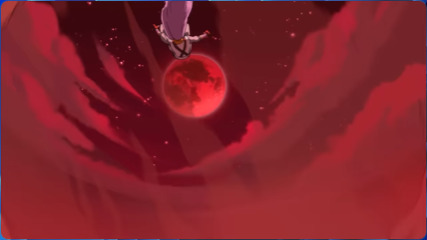
The camera stops moving when it sees the red moon, because now the viewer has something to orientate themselves around. There is a constant point, and we can see Imogen falling down. And getting closer, and closer, and closer, until.
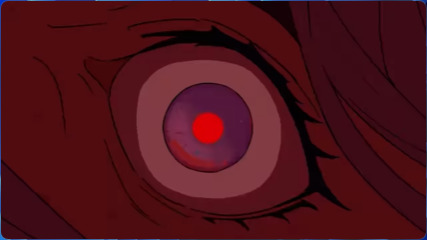
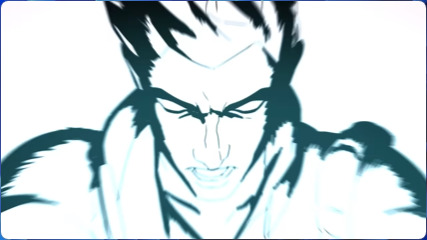

These are the three frames in order, there is nothing in between.
Imogen crashes into the screen, and we get an abrupt impact frame (that's the black and white one) then Ashton. This is so cool to watch, in my opinion, but it is quite possibly the opposite of smooth in camera work. So why is it so cool? Motion.
The motion is in towards Imogen and out away from Ashton. They are both falling, just in different directions. And the impact frame both helps smooth over and accentuate the abrupt transition.
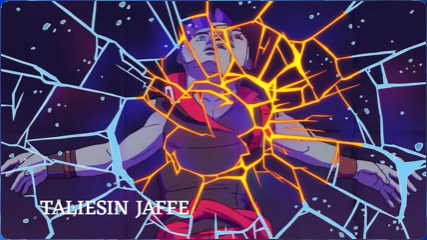
The camera around Ashton is a tracking shot. They are falling, but they remain the exact same in the screen (shrinking slightly). The rest of the world moves. And when Ashton lands, the screen cracks. The tracking shot is used to show Ashton's disassociation with their surroundings. Not in a "I feel nothing" type of way, but in a "it's me vs the world" type of way.
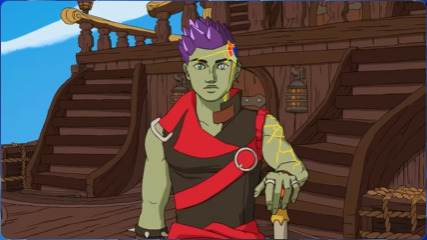
Then, there is an abrupt cut away. Nothing hides or smooths this at all, because Ashton's memory isn't smooth, and neither is Ashton. Remember the disassociating thing I mentioned, now it changes again to someone who gets lost in his thoughts. Medium.com calls this an "anxiety stare" and as someone who does that on the regular, I can attest to this abruptness being exactly what that feels like.

I'm not going to talk too much about the ship, but just be aware that there is a Dutch angle (the horison is diagonal) here to heighten the stress of it.
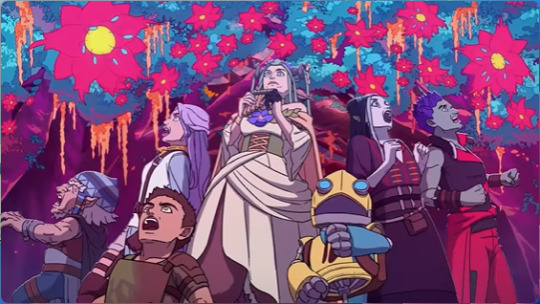
Likewise with this shot, there isn't much to talk about. The slow outward zoom and triangular composition are neat, and the tiered reactions (bottom row reacts, then middle, then Fearne) are amusing, but other than that, not much.
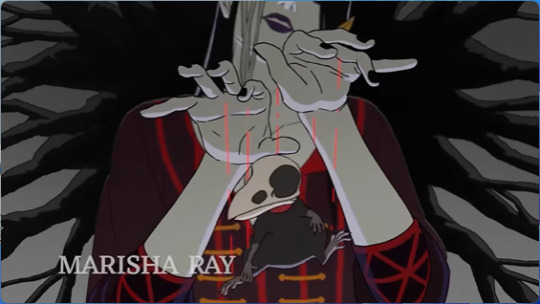
Then we meet Laudna, playing with Pate and giving him life. That's a neat little shot, I wonder if there's a metaphor there.
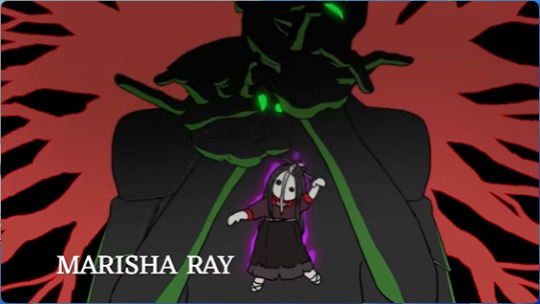
Oh.
This is a super cool visual because it establishes exactly who this character is in two seconds. But I also want to point out the symmetry of this. The hair becomes the blood which becomes the hair again, and then the tree.
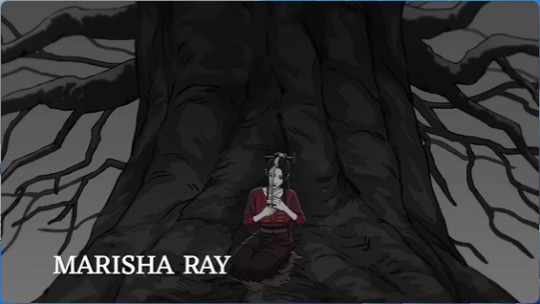
Laudna is introduced as big and scary and imposing, and that is very intentionally undercut by making her look small.
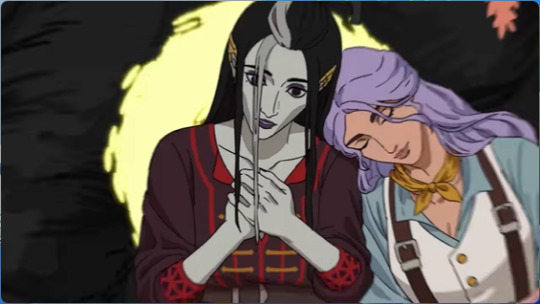
Being small means you are less likely to be the focal character, so shrinking Laudna takes away her agency. Only to give it back through Imogen, and when the camera pans back outwards, Laudna is the same size, but the colours and the surroundings make her feel less alone, and as a weird result of that, less small.
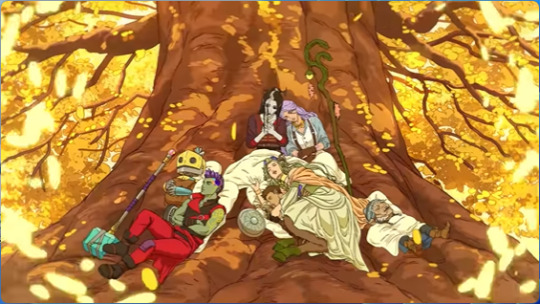
And last but not least in this moment, there is the delayed drop of the hands. Laudna finally feels safe and finally breathes a sigh of relief.
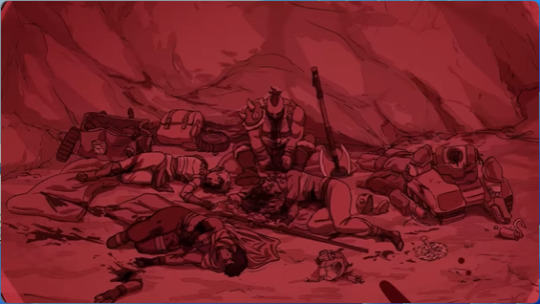
That, however, imediately match cuts to this. FCG's vision. The red tinting has obvious implications that I don't need to explain, but the match cut heavily implies a connection between this group and the Bells Hells. There is a fear that this might happen again made clear by a single transition.
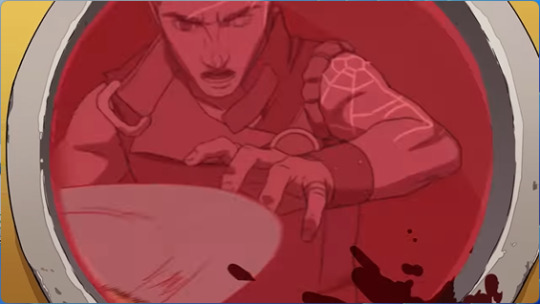
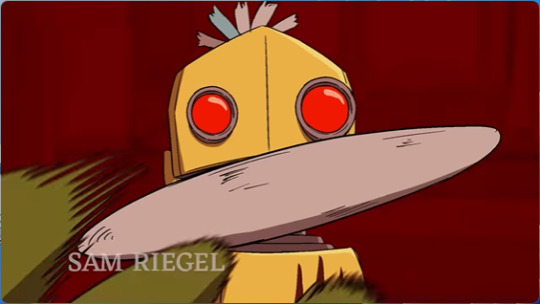
Here's something else. FCG doesn't move. At least, the camera doesn't treat them as moving. It's a slow panning out as if nothing is happening. It's the disassociation vibe that you get from Ashton's falling shots now repurposed to someone who isn't in control of their own actions. This is what FCG is afraid of, this is the important pieces of his character. This is FCG.
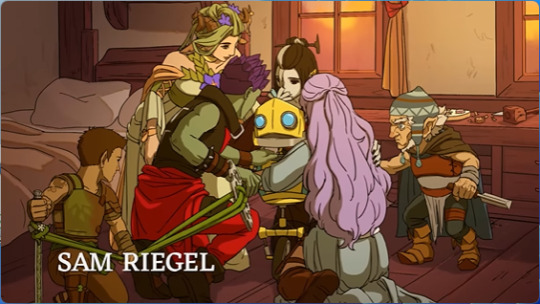
And just like Laudna, FCG finally gains agency when surrounded by their friends who hug them, and FCG finally moves.

Chetney Pock O'Pea, outlaw of the RTA, alpha of his own heart. A fundamentally chaotic character who takes rules as suggestions to be intentionally ignored. A man who's first instinct upon meeting you is to consider how you could be killed. And he is introduced whittling, with a steady camera and warm light illuminating his face. This is a peaceful side of Chetney, there is a duality to him.


Speaking of which, notice how Chetney draws back from the light as he transforms. His eyes begin to glow, but they don't illuminate him, until this:

Chetney is now backlit by the cold light of the moon itself (There's a neat reveal of Ruidus caused by the pan, but that's only tangentially relevant). Notice how much further you are from him here than in his first shot. But notice how much of him is visible, and how much of the screen he takes up. It's the same, this is still the same character. It's a true Doctor Jeckyl and Mr Hyde character. This isn't split personality, but a character who can be a different person in each form, while still remaining Chetney at all times.
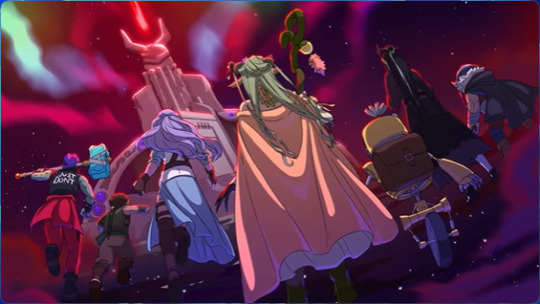
There is more in this video. I encourage you to watch it, but unfortunately, Tumblr has a limit on how many images I can include, so I will leave you with this final shot. A group of heroes looking up at a threat that is so much bigger than them, a threat that is literally controlling the light. But the Bells Hells are closer to the camera, they take up more of the screen. The battle isn't lost, instead, it is just starting.
#rants#literary analysis#literature analysis#media analysis#critrole#critical role#bells hells#imogen temult#laudna#ashton greymoore#fcg#orym of the air ashari#fearne calloway#chetney pock o'pea#its Thursday night#critical role bells hells
516 notes
·
View notes
Text
You don’t know how much I would kill for a version of this book from Camilla’s perspective. I have so many questions. Who was she really? What role did she have to play in all the events that unfolded?
I can’t help but think it must have been more sinister than the other characters due to Richard completely omitting anything about her character and personality to such a degree. He romanticized her more then Henry and Julian to such an extent she’s an enigma.
Her story about what happened to the farmer is completely different from Henry’s. She was the only one covered in blood. The group is very protective of her as evidenced by the scene when she injured her foot. She’s the only one in the group who remained cool and unfazed after murdering Bunny. She is seemingly unaffected by the breakdown of the group. She’s aware of the nature of Francis and Charles relationship and does nothing to help him. When Charles begins to spiral further in his addiction she leaves him behind and goes to Henry for protection.
Did she murder the farmer? What did she really think about Richard? Or Henry? How much did she know? How much did she manipulate? So many possibilities.
#Tsh#the secret history#donna tartt#camilla macaulay#bunny corcoran#edmund corcoran#dark academia#bookish#booklover#books#francis abernathy#richard papen#henry winter#books and reading#dark academia books#classical studies#book quotes#literature analysis#literature
680 notes
·
View notes
Text
I know I’m like half a year late to recommend it, but The Sin Squad just put out a great video on how difficult it can be to find actual dog whistles and problematic material in fiction versus paranoid reading (aka gearing yourself up to find a reading to such things where they might not be intended)
youtube
I recommend it for everyone to at least give it a few minutes if your time because it’s some solid work and high quality analysis!
#lion king#film analysis#book analysis#literature#literature analysis#the sin squad#books#YouTube#literary analysis#fiction analysis#disney#parahumans#paranoid reading#dog whistles
148 notes
·
View notes
Text
I know the average reading comprehension on this site is zero but I'm different. I'm applying wildly inappropriate analysis lenses to popcorn media. I'm doing a queer theory reading of Horus Heresy novels. Now I'm doing feminist analysis of Warhammer 40k canon. Now I'm applying Marxist analysis to The Outsiders. Time for a historical analysis of The Locked Tomb. A post-colonial reading of the entirety of Doctor Who. A psychological anlaysis of Twilight. On the horseshoe scale of reading comprehension I'm at "so much reading comprehension that it loops back around to not understanding books at all actually". You can't stop me. I'm literary analysis Georg
#I paid many thousands of dollars for this degree#and by god i will use it#literature#Literary analysis#Literature analysis#Media analysis#literary criticism#reading#reading comprehension#meta analysis#literature major#literature memes#lit crit#media literacy
328 notes
·
View notes
Text
I find it very funny when people think that dystopian fiction is a warning for imaginary future issues that could arise and not a commentary on the very real very current failings of governments and society as a whole. And obviously it’s exaggerated because it’s fiction but the point is to sensationalize the absolutely insane things that are actually happening and typically get dismissed because of privilege or a desire to ignore/an inability to comprehend the true state of the world. This is particularly true for those of us that are disadvantaged in some way.
#actually autistic#autistic experiences#invisible disability#physical disability#disability#queer stuff#queer community#social justice#literature analysis#dystopian fiction
121 notes
·
View notes
Text
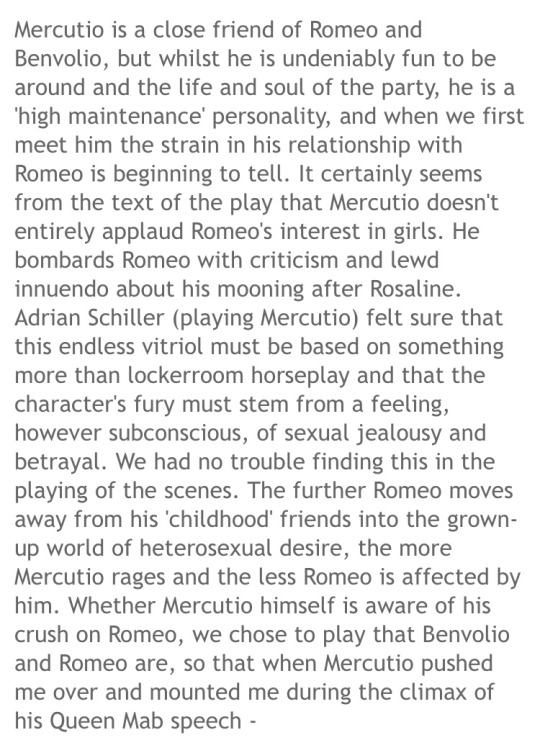
Loosing my mind over this…
#romeo and juliet#romeo montague#mercutio x Romeo#Mercutio#Shakespeare#shakespeare analysis#literature analysis#david tennant#Rsc#shakespeare plays
117 notes
·
View notes
Text
Heard someone say Robin Swift in Babel has no personality….
When will you understand that being a ‘threat’ in colonial structures strips you of identity and only allows you to exist in opposition. He has humour, he finds joy, he has passion, but none of that matters as the system is not built to express those characteristics from him!
The review also said the book was just white people hate repeated in different ways, when will you look deeper and realise that colonial powers are built to serve white people and run levels upon levels deep. It is embedded into everything the British empire does! In what they eat, their hobbies, their entertainment, their finance, their goverment etc etc.
From a narrative stand point, you can dislike these things. But Babel isn’t just telling a story, it is retelling history and creating fantasy symbols to make that history accessible to everyone! The symbol of silver work encompasses the entire Industrial Revolution and makes it digestible for those uneducated in that field. This book rejects colonialism through the narrative.
Someone also said the translators notes were useless. R.F Kuang uses a third perspective and translator’s notes to present this story as we read other stories of colonialism, we are fed it through others, we will never know the pure raw truth. Kuang also moved to America when she was four, she herself is a translator for her own history! She is also educated in Oxford, Cambridge, Yale etc. The addition of translator’s notes adds a level of depth to this story that I adore!
This is why Babel is a necessary read for all those wanting to learn more about colonial history, esp in China and India.
#literature#books#dark acamedia#babel rf kuang#rf kuang#babel or the necessity of violence#babel an arcane history#babel#literature analysis
68 notes
·
View notes
Text
lookism ch 484 semi analysis semi rant
ok so MAYBE im just projecting good character writing onto lookism because frankly, after the shitshow that was 1A, i have lost a lot of confidence in ptj's writing abilities, but i GENUINELY think the ending sequence of today's chapter was incredibly done

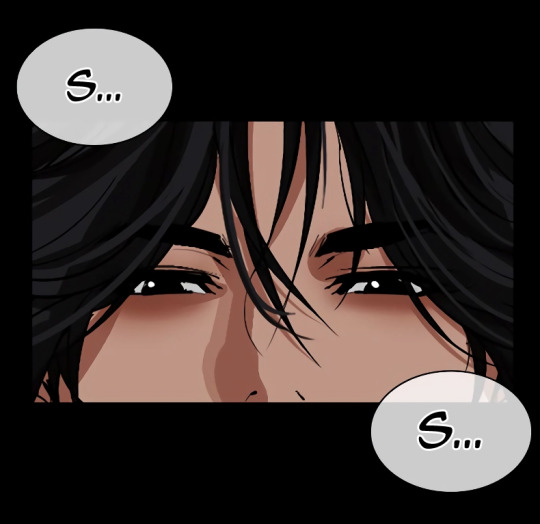
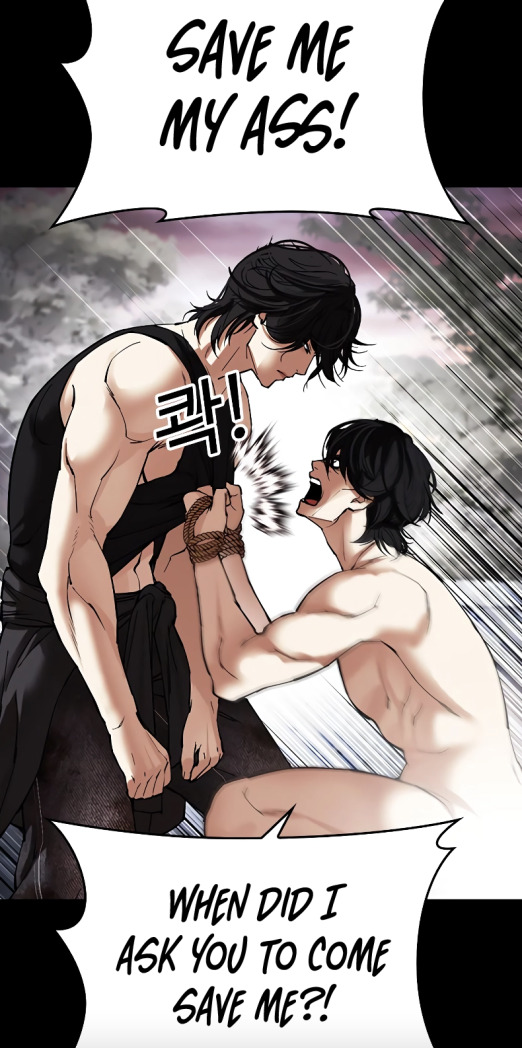

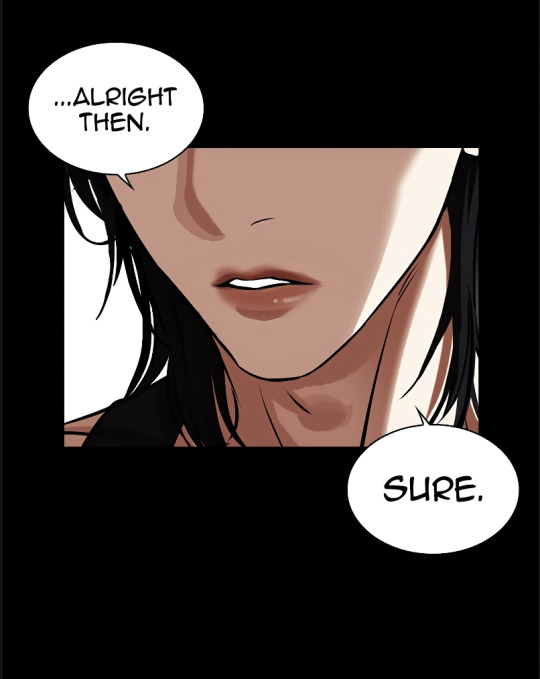





like... idk...
it's not that vin jin didn't want to be saved. he did. he spoke out against the shaman and the village and probably secretly wanted someone to agree and to change their ways and save him; it's just that he felt like it was too hard and too embarrassing to be saved by a village that hated his very existence. every time he tried to speak out against what was happening to him, he would only be punished, so he was gradually taught that wanting to be saved was something shameful and that would be punished. and since he would only get disappointed again and again by trying to look for salvation, he decided he would stop looking. he takes pride in that, really. he takes pride in growing up and fending off the bullies and being strong and he hates the idea of needing to be saved because... why wouldn't he?
it's never worked in the past. a mix of his defense mechanism of being a mean person to stop others from hurting him and his internal self-hatred that secretly believes that he brings suffering to the people around him and that he is a monster combine to create a sort of "i'm good enough on my own. i neither want nor need to be saved" kind of mentality. he doesn't want to be vulnerable enough to admit that he really wants to be saved so seeing him take that first step admit that "yes, i want to be saved" is SUCH a cathartic moment. it's like that one kim dokja "ah, as i thought, i'm glad i survived" moment. it's not a particularly poetic or life-changing statement, but the fact that it comes from someone that, before this point, has only ever wanted to die and has never expressed that they wanted to be save or keep living just makes it hit a lot harder.
and the fact that he is validated for the first time after this, not only because he realizes that seongji, someone he perceives as cool and strong and noble is also a "monster" like him (thus indirectly implying that he can also change his circumstances and improve his station), but also because he was finally recognized as anything but a monster.... i think the expression in that panel really expresses that emotion well. the sort of warmth and shock from being cared for and approved of for the first time since his mom died.
its just so UGH... but maybe im reading too much into it.
#lookism#lookism manhwa#lookism webtoon#seongji yuk#vin jin#jin hobin#lookism rant#looksim 484#literature analysis#sort of#more like a rant#hehe#so surprised that ptj can still write because the cheonliang arc has been rlly great so far#hopefully it doesnt fall off#my girl mary only deserves the best
93 notes
·
View notes
Text
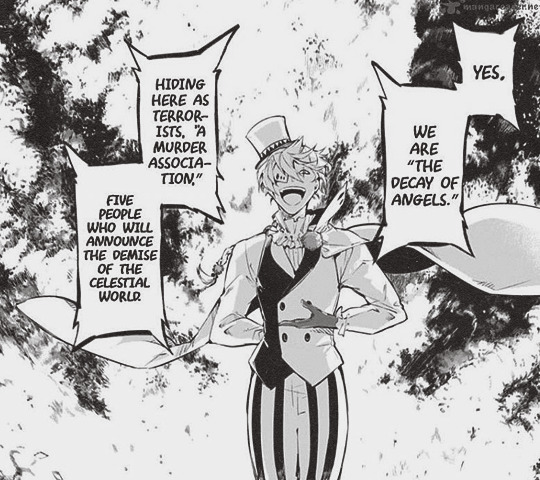
BUNGO STRAY DOGS VS LITERATURE: THE DECAY OF ANGELS
This is going to be the first in a long (long) running series where the goal is to read every single book mentioned by name in Bungo Stray Dogs, and try to connect the themes of that book to the characters who are referencing that book. In light of the recent arc I am starting out with "The Decay of Angels" the villainous organization consisting of Bram Stoker, Nikolai Goggol, Fyodor Dostoevsky, Ochi Fukuchi and Sigma.
The name Decay of Angels comes from Yukio Mishima's novel, the Decay of the Angel. The fourth and last book in his Sea of Fertility tetraology which is widely considered to be his masterpiece. I read all four books, so underneath the cut I'll elaborate on the connections between Yukio Mishima's work and Bungo Stray Dogs.
1. The Decay of the Angel
The Sea of Fertility is a tetralogy of novels written by Japanese AUuhor Yukio Mishima. The four novels are Spring Snow, Runaway Horses, the Temple of Dawn, and the Decay of Angel. The main timeline of the story stretches from 1912 to 1975, the main character of all four books is Shigekuni Honda a law student in Spring Snow, who's best friend Kiyoaki Matsugae dies at the age of twenty at the end of the first book. In each sequel, Shigekuni meet what he believes are the reincarnations of Kiyoaki, who are condemned by karma to die at an early age. Every time he attempts to save them from their deaths he fails.
The strongest connection between the Sea of Fertility itself, and the "Decay of Angels" organization depicted in Bungo Stray dogs is that both are heavily inspired by Buddhist ideology. The Sea of Fertility is an exploration of the concepts of both "reincarnation" and "karma" while the ideology of the decay of angels is to enact Karma in the real world for the past sins of the governing body.
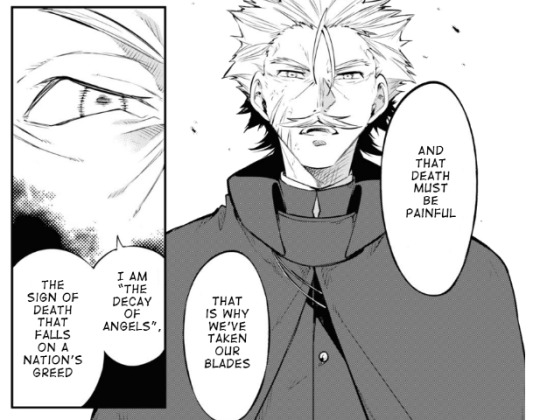
The brihadarankyaka Upanishad states: Indeed the person performing a good deed will become benevolent, and one performing a bad deed will bcome evil; one becomes pure by pure acts, and black by evil acts. Therefore it is said: a human being is composed of karma, or "desire" by following karma one creates will, by following will one creates karma, and through karma, samsara comes into existence."
The Temple of Dawn
Both the ideology of the Decay of Angels, and Yukio Mishima's work make constant references to budhism like this. Budhists conceive of the world as a suffering-laden sycle of life, death and rebirth without beginning or end known as Samsara. In essence in budhism, beings are driven from life to life in this system by karma which is activated by good or ill actions committed in this life as well as previous lives. Fukuchi's goal is more or less to make Karma real and enact it with his hand, to punish governing bodies for their past sins.
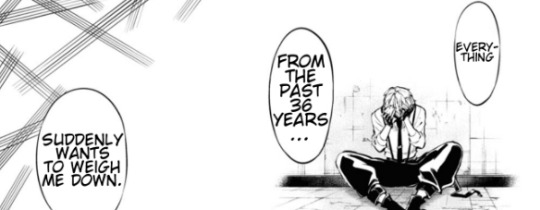
His ideals are also heavily budhist in nature, more or less budhists believe suffering in inherent to life. The goal of budhism is actually to stop being reborn and escape the cycle of death and rebirth by eventually purifying yourself of earthly desires, etc. etc. Fukuchi's goals allign with these ideas. Just like reality and earthly desires inherently cause suffering. As long as governments exists, they will continue to create war. The only way forward is to create a death and rebirth. Governments have to die, so society as a whole can be reborn into a higher, more enlightened state. He is essentially twisting lofty budhist ideals to justify his extreme political actions.

Bungo Stray dogs also borrows some symbolism from the fourth book, the Decay of the Angel. In budhist scripture Devas are mortal angels. A topic the fourth book discusses at length.
Here is the account in the twenty fourth fascicle of the Ekottara-augama: "There are thirty-three angels and one arch angel, and the signs of death in them are fivefold. Their flowered crowns wither, their robes are soiled, the hollows under their arms are fetid, the body ceases to give off light, it loses awareness of itself."
Decay of the Angel

There are five members of the decay of angels in BSD, Fukuchi, Fyodor, Goggol, Bram, and Sigma, just like the five stages of decay. Just as in budhist belief death comes for everything, even the angels, the stated goal of the organization is to bring death to the members of the world's government. Quite literally in Fukuchi's case, by controlling a vampire army (vampires being symbols of death due to being undead and bloodsuckers themselves).
2. Death and Rebirth
The main premise of the Sea of Fertility is tracking the four reincarnations of one individual. Each successive reincarnation lives a short life and dies for the sake of an ideal.
'Kiyoaki Matsugae was caught by unpredictable love, Isao Iiinuam by destiny, Ying Chan by the flesh. And you? By a baseless sense of being different, perhaps? If destiny is something that takes hold of a person and drags him after, then the other three had desinty. And has anything caught you?'
The Decay of the Angel
The whole organization of Decay of Angels, is seeking a somewhat symbolic death and rebirth of society, but at the same time as individuals four members are seeking to die for the sake of an ideal like the four lifetimes of Kiyoaki.

Gogol's may seem to be the simplest, to commit suicide in order to free himself entirely from god's will. He may be a russian character, but even some of his ideals are budhist. One of the major differences between Budhism and Hinduism as commented on in the books, is that Hinduism believes in the divine whereas in Budhism there are no gods. Not only do they reject gods, but they also reject the idea of a "soul."
"Budhism does not recognize the soul as such. If there is no core substance called soul in beings, there is of course, none in organic matter. Indeed quite like a jellfyfish devoid of bone there is no innate essence in all of creation. . If we assume there is no self, what is the basis of the birth-and-death cycle to start with?... WHen the Threavada Sautranika school evolved the concept of "seed perfurming" was established according to which the effect of a good or bad deed remains in ones consciousness, permeating it as the fragnace of perfume permeates clothes and thus forms character."
Gogol's ideal is similiar to that belief, he rejects both the idea of god, and the idea of his soul, in order to prove that all that exists of the universe is his free will and consciousness. He even goes through a metaphorical death and rebirth in order to reach that ideal, he fakes his own death, and then is revealed to be alive.
There's even a discussion of free will in several of the books, particularly the fourth.
"He should have armed them with the foreknowledge that would keep them from flinging themselves after their destinies, take awaay their wings, keep them from soaring, making them march in step with the crowd. The world does not approve of flying. Wings are dangerous weapons. They invite self-dstruction before they can be used."
Decay of the Angel
If you wanted to parallel him to one of the lifetimes, you could even say he is much like Kiyoaki, someone caught up in an unpredictable love. At one point in the story, as he's dying of sickness he continues to try to visit his lady love every day for the sake of seeing her one last time and considers facing his impending death to be a trial to prove his love. Gogol similiarly puts his closest friend through a life or death trial to see if his feelings spring forth from himself and his own free will, or are brainwashing.

"I'd tell myself in it was because I was insincere. I'd know in my heart that if only I had gotten out of the rickshaw and walked, no matter how weak I felt, then such sincerity - even if she was unaware of it - would have affected her, and she would have seen me. That's it then. There's no reason to have such regrets. I have no other choice but to risk my life, if I want to see her. To me, she's the essence of beauty. ANd it's only that which has brought me so far."
-Spring Snow
The second lifetime lived by Kyoaki is that of Inao who is a far-right extremist in Japan, who wishes to see japan return to its more imperialist ideals. As a whole these novels take place over a time frame that's post the russo-japanese wars, all the way to the lead up into world war two, and then post world war two. There are pretty obvious references to world war two (the island where Fukuchi fought on being a reference to Okinawa, Ahabaraki being a reference to the nuclear bomb). Bungo Stray Dogs also clearly takes place in a post-war society. The motivation of the current villain Fukuchi is the mistreatment of soldiers during that previous war.
Fukuchi resembles Isao, the far right extremist. In the second book there is a long recounting of the history of the Satsuma Rebellion. It was a revolt of disaffected samurai against the new imperial government, nine years into the Meiji Era. In the book it’s mentioned they prayed at a shrine a number of times, and waited to rebel until they believed the god’s themselves approved of their rebellion. The main character of the book Isao wants to enact a similar rebellion against the government to rid Japan of western influence and to make the emperor all powerful again.
The sins I refer to have nothing to do with the law. And the greatest sin is that of a man who, finding himself in a world where the sacred light of His Majesty is obscured, neverthless determines to go on living without doing anything about it. The way to purge this grave sin is to make a fiery offering with one's own hand, even if that itself is a sin, to express one's loyalty in action, and then commit seppuku immediately. With death, all is purified
Runaway Horses
The goal of the main character is to "before the sun... at the top of a cliff at sunrise, while paying reverence to the sun... while looking down upon the sparkling sea, beneath a tall, noble pine... to kill myself..." He is a man who wants to commit a sin he believes will put his country on the right track, and then die for his country. He also believes the only way forward is a military coup (guess what happens in japan in a couple of years). Fukuchi's goal may be the opposite, but he still uses the same methodology. He has seized full and total control of the world's governments acting as an ultimate emperor to achieve his goal. Everyone else is just instruments and puppets to him, he literally changes them into mindless zombies.
"Here was the power of the emperor himself. Only on this drill ground was the hand of the sun working with a mathematical clarity and precision. Only here! The will of the emperor penetrated the sweat, the blood, the very flesh of these young men, piercing their bodies like X-Rays."
Runaway Horses
Fukuchi's goal is essentially to fight imperialism by using tools of imperialism himself. He also invokes the divine when fighting against Akutagawa and Atsushi, saying he carries and enacts the divine will. He is focusing all power on himself, the same way Isao wished for the emperor to have total control and authority of the country once more to purge out western, socialist, and capitalist influence.

He also, just like Nikolai experiences a death and rebirth on the battlefield. Fukuchi was once manipulated like Isao by far-right ideals that joining the military would equate to protecting both his comrades and his countries, only to be eaten up and chewed out by the war-machine and not accomplishing protecting anyone but the governments already in place, creating the current Fukuchi.


Just like the deaths of his comrades were wasted, Isao also experiences a disapopinting suicide which is the exact opposite of what he wanted, and the ideal of dying with honor presented throughout the story. Which clearly illsutrates all the militaristic and far-right ideals Isao believed in through the story, were proven false and nil by the end.
“The sun will not rise for some time,” Isao said to himself, “and I can’t afford to wait. There is no shining disk climbing upwards. There is no noble pine to shelter me. Nor is there a sparkling sea.”
Runaway Horses
The third book features Thai Princess Ying Chan who is said to have been caught by the flesh. This will be the shortest section because the third book is very dark, but basically the third book the Temple of Dawn deals with how the elder generation of japan, preys upon and takes advantage of the youth. Ying Chan because of her youthful body, is molested by two adults who she trusts.
Sigma is someone similiar to Ying Chan, a youth who is born and then continually used by everyone around him in his life. He is the ultimate child taken advantage of by society passed over again and again due to being born from "nothing."

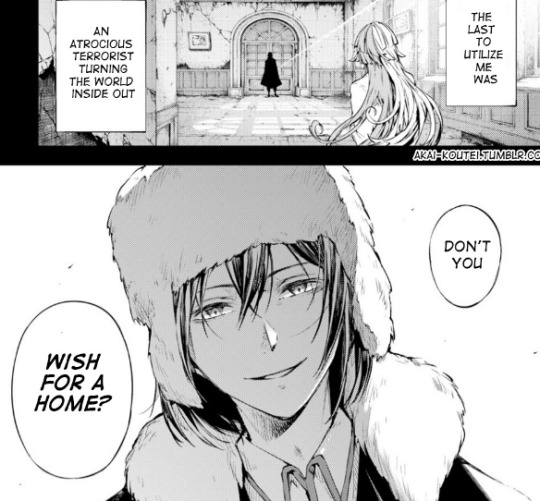
The last reincarnation depicted in the fourth book "The Decay of the Angel" deals heavily with themes of nihilism, and deeply resembles Dostoevsky. Especially if you believe Fyodor is in part an adaptation of Raskolnikov's theory that truly great people should be above morality as depicted in crime and punishment.
Toru's goal in the Decay of Angels, is to devote himself to a pure form of evil and get lost in the pursuit of it. He is depicted as a twenty year old exceptionally brilliant individual who does not form relationships, is detached from the society around them, has no strong pursuits except for this, and his highly nihilistic believes. The kind of nihilism that is portrayed for its flaws in many of Dostoevsky's works.
"My purity will presently wander beyond the horizon to that invisible realm. Probably not on the end of unbearable pain, I shall seek to become a god. The pain! I will know of it, the pain of absolute silence, a world of nothing at all. I will crouch in the corner, like a sick dog. And the happy ones will sing songs around me. There is no medicine for it. No hospital. It will be written in tiny gold letters somewhere in the history of the race: that I was evil."
Which mirrors the description of Fyodor in his introduction as something "Darker than evil, something horrifying."
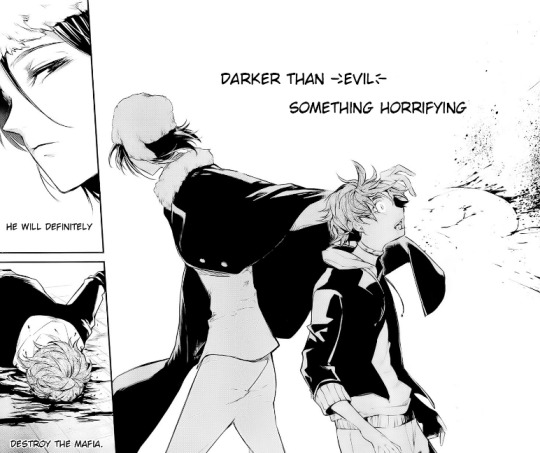
Fyodor is also someone with a large blind spot when it comes to ordinary people, this is something he is lectured on by Dazai. That he believes he has enough control like a player sitting outside of the gameboard that he can control the movment of every single piece. That the world is controlled by great people manipulating it. Whereas Dazai's beliefs are the world is controlled by everyone's actions moving together in an unpredictable fashion, rather than a god sitting outside manipulating things.

Toru receives a similar lecture because he bbelieves himself to be some kind of great man due only to his extra intelligence and how isolated he is from others.
"There is no special right to happiness and none to unhappinnes. There is no tragedy and there is no genius. Your confidence and your dreams are groundless. If there is on this earth something exceptional, special beauty or special evil, nature finds it out and uproots it. You thought didn't you, that you were a genius beyond compensation. You thought of yourself, didn't you, as a beautiful little cloud of evil floating over humanity."
The Decay of the Angel
Which seems to be the lesson that the story is going in the direction of teaching Fyodor, that there is no such thing as inherent specialness, exceptional people, gods or demons.
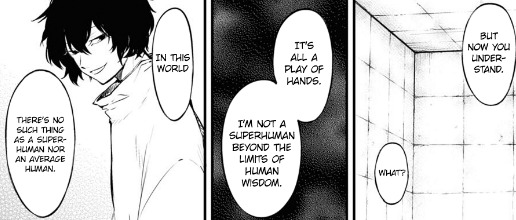
Fyodor is also someone who while he has no undergone a death himself, his goal is to deal death, which he seems to be able to do with just a touch of his hands, in order to make the world reborn into a “world without the evil of ability users”. Death, birth, and rebirth are themes that are strong with all five of these characters.
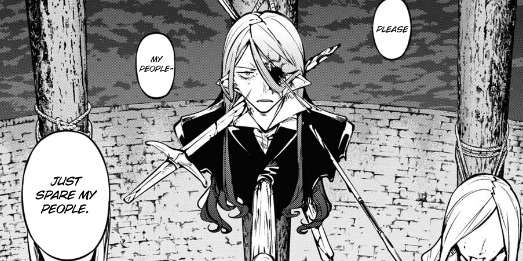
As for Bram he’s the character we know the least about, but I would say while Fyodor, Fukuchi, Gogol and Sigma can be equated to individual lifetimes of Kyoaki, Bram himself being an immortal vampire and oldest of the group is much like Honda who is an outsider and witnessing the lives of young people being reborn over and over again. Especially since by the fourth book he is eighty years old and essentially a helpless elder. The various lifetimes of Kiyoaki die young, he lives on a much emptier life than any of them. Bram’s just a head. He’s the most helpless of the whole group. He’s just a witness to all of this. But he’s also an immortal vampire, so therefore an outsider to the cycle of death and rebirth.
Well, that is all I have to say about “The Decay of the Angel” and the connection to the “Decay of Angels” depicted in Bungo Stray Dogs, and the five members who make it up. I fully reccomend picking up the book, just as Bungou Stray Dogs is shaping up to be anti-war in its text and the depiction of several successive generations (the war generation, the post war, the Sea of Fertility is a massive work referred to as “the most complete vision we have of Japan in the 20th Century” by Paul Theroux. It deals with similiar themes in BSD of the changes between generations, the shift in society of japan in the last century, the influence of imperialism. If you want to pick it up and read it, it comes highly recommended by me!
#bsd meta#bungou stray dogs meta#bungou stray dogs theory#bungou stray dogs#bungou stray dogs analysis#fyodor dostoevsky#bsd fyodor#nikolai gogol#bsd gogol#fukuchi ochi#sigma#literature analysis#the decay of angels#yukio mishima#decay of angels#doa
351 notes
·
View notes
Text
Revisiting the Rat Cook, Part 1: The Best Pie, and Lord Lamprey
This is the first part of a series I've been sitting on for a while, where I'm going to examine the symbols and themes present in the "Rat Cook" story, as relayed by Bran in ASOS Bran IV, and search reappearances of those elements throughout the rest of ASOIAF.
This series is predicated on the understanding that these books are rich with intentional symbolism, metaphor, and allegory, and that the repetition of these symbols and themes adds to their meaning.
In general, the symbols that are present in ASOIAF are limited by their ability to be inserted into the plot of the story (i.e. if the symbol of a stag killing a direwolf is important, there must be a way in which the characters are able to encounter such a scene within the plot's context). However, the metadiegetic legends that exist in-world for the characters of ASOIAF are not beholden to the same restrictions, and because GRRM is able to invent these myths in their entirety without restrictions on any of the individual symbolic elements, we can trust that each separate element of these in-world myths was placed intentionally.
With that in mind, I believe we can use stories like that of the Rat Cook as a sort of "road map" when looking at the reappearance of these same symbols and themes elsewhere in the story; I believe the "Rat Cook" story is the most distilled example of these elements. I don't mean to say that every instance of "rats" references the Rat Cook directly, but that the Rat Cook story provides a place where Martin is able to use these symbols in their most abstract form and describe their relationship to each other, so that when we see them appear again elsewhere in ASOIAF we might better understand what we are being shown.
So, among other things, the Rat Cook story is about a rat which eats rats, or a cook who serves kings; The Rat Cook story is about fathers and sons, about cannibalism, about trust, about vengeance, and about damning one's legacy.
This is likely going to be a 9-part series, but ideally almost all of these parts will be able to stand on their own. Each post will inform the next as I build my analysis, but hopefully each individual post is also interesting in its own right.
RtRC Part 1: "The Best Pie You Have Ever Tasted" and "Lord Lamprey"
This opening part, for better or worse, is going to retread some well-discussed ground: the clear parallels between the "Rat Cook" story and the incident in which Lord Manderly serves certain overlarge pies in ADWD The Prince of Winterfell, a scene lovingly dubbed "Frey Pie". However, as well-established as this comparison is, I want to begin here so I can begin to introduce how a closer analysis of the Rat Cook themes are present in this uncontroversially parallel scene, and how they might add more depth to interpreting that moment.
Not only does the scene evoke the same imagery, serving pie to the Lords amidst conspicuously missing sons, but the connection becomes even more direct when Wyman Manderly looks directly to the camera and says, “Hey reader, if you’re wondering where those Freys are, think back to any scary stories you know about pie”.
Okay, he doesn’t actually say that, but it’s close enough, and as much of a nudge we’re like to get from Martin (and which still went over my head on my first read through). Instead he does the next best thing, cueing Abel to sing while staggering past our POV:
"We should have a song about the Rat Cook," he was muttering, as he staggered past Theon, leaning on his knights. "Singer, give us a song about the Rat Cook."
Manderly seems to acknowledge the similarities himself, and most have noticed as well.
However, making the comparison between the story of the Rat Cook and Manderly’s actions is particularly interesting in their differences.
There are many ways in which Manderly’s pies, as a mirror, are appropriately an inversion of certain elements in the Rat Cook myth.
Returning to the scene as we see it in ADWD The Prince of Winterfell:
“Ramsay hacked off slices with his falchion and Wyman Manderly himself served, presenting the first steaming portions to Roose Bolton and his fat Frey wife, the next to Ser Hosteen and Ser Aenys, the sons of Walder Frey. "The best pie you have ever tasted, my lords," the fat lord declared. "Wash it down with Arbor gold and savor every bite. I know I shall."
“True to his word, Manderly devoured six portions, two from each of the three pies, smacking his lips and slapping his belly and stuffing himself until the front of his tunic was half-brown with gravy stains and his beard was flecked with crumbs of crust.”
Manderly takes on only some of the roles of the Rat Cook here. Despite his status as lord, he plays the role of the humble cook, personally serving Roose Bolton, Walda Bolton (née Frey), Hosteen Frey, and Aenys Frey, all standing in for the “Andal King”. In this way, the role of “Andal King” as someone who has official power and the role of “Rat Cook” as effectively powerless dissident are played out straightforwardly. Bolton and his allies are backed by their army and the authority of the crown while Manderly has no official backing of his own.
Wyman even physically resembles the Rat Cook; Wyman’s blue eyes indicate he is presumably pale, and Wyman is prodigiously large, to mimic the descriptor of “white, and almost as huge as a sow”.
However, like the “Andal King” himself, who had a “second slice” of his own son, it is Wyman Manderly, and not Bolton nor the Freys, who devours two portions from each of the pies. In this way, the roles have elements which are interchangeable.
Wyman is acting out both roles, which is especially interesting because in this comparison is a single most definitive contrast: The Rat Cook, most notably, is not punished for serving the pie, as "a man has a right to vengeance". Instead, he is punished for violating guest right.
Now, Wyman—who lost his son to the Freys at the Red Wedding—certainly has a “right to vengeance”, but betraying guest right is something which Wyman Manderly takes great pains not to do. Manderly conspicuously notes that he gave the three dead Freys guest gifts upon their parting, marking them as no longer guests under his roof, and subsequently, theoretically, freeing him to kill them. Manderly introduces the idea while Davos marks the distinction for the reader’s sake in ADWD Davos IV:
“The Freys came here by sea. They have no horses with them, so I shall present each of them with a palfrey as a guest gift. Do hosts still give guest gifts in the south?"
"Some do, my lord. On the day their guest departs.”
The Freys, on the other hand, as executors of the Red Wedding, are the most notable violators of guest right, while the Boltons contributed their part as well; both are being punished for that sin by Manderly-the-Rat-Cook here, marking the inversion of the story. In this iteration, the party serving the pie seems to warrant no judgment; instead, the pie itself is the judgment, served as retribution. With that connection in mind, it's worth remembering the other importance of the Rat Cook story, based on its placement in ASOS and which I think has often been overshadowed by Manderly’s “Frey Pies” incident.
In the Rat Cook story, after the Rat Cook's punishment, he spends an immortal future forever eating his own descendants, a scenario in which Bran describes the rats of the Nightfort as “children running from their father”. That eternal, kin- and legacy- devouring doom does not just come secondary to the punishment, it is a part of the punishment following the violation of guest right, and introduces the notion of an entire family being cursed for that violation... and, for good measure, is brought up in ASOS Bran IV, chapter that occurs only a few chapters after the Red Wedding itself.
In one respect, this is just another reinforcement for the reader of the sanctity of guest right and of the laws of the old gods. Coming so soon after the Red Wedding, the Rat Cook story hints at the fall of House Frey. Walder Frey, most culpable violator of guest right, has apparently doomed the rest of his dynasty to death, punished for his actions, the way that the Rat Cook, too, is a patriarch who creates not only his own ruin but also the ruin of his progeny. Although Walder himself is not literally tying the nooses, it is Walder who has metaphorically become the father "devouring his children" indirectly through his ruthlessness. Wyman Manderly, then, is merely an agent of that doom.
On the subject of the Freys being cursed by violating guest right, only one of the named consumers of the pie, Aenys Frey, is truly mirroring the Rat Cook legend by literally eating his own son, Rhaegar Frey. Both Aenys and Hosteen Frey, on the other hand, are specifically called out in the scene as being the “sons of Walder Frey”. It’s appropriate within the mirrored Rat Cook motif to invoke Walder’s name as patriarch as well as the promise of other “sons” that might succumb to their father’s insatiable appetite for status; this sentence invokes the dynasty of the Frey household. Indeed, Walder Frey himself also has shared motifs with the Rat Cook: like the immortal Rat Cook, Walder Frey has nearly innumerable children and grandchildren, and he too seems to refuse to die.
If a named heir in Westeros is like the ASOIAF version of Chekov’s gun, then the Late Walder Frey is sitting on Chekov’s arsenal; once he becomes the late Late Lord Frey, it’s going to explode. If that happens in an upcoming book, then the Rat Cook story might be setting up the idea of how an eventual succession crisis of House Frey might further this metaphorical connection, with this doomed family turning on itself, each running from the shadow of their father’s legacy like the Rat Cook's children run from him in the Nightfort.
Lord Lamprey
Now, to push through a little more symbolic linking between the Frey Pie scene and Lord Manderly:
If we consider the “pie” element as a key part of the Rat Cook story, then seeing a “pie” specifically in the hands of Wyman Manderly prompts a connection with a noted favorite of Manderly’s: lamprey pie. As early as ACOK Bran II, we learn that:
“His own people mock him as Lord Lamprey”,
Interestingly, we see in that same chapter a telling metaphor considering Manderly and lampreys not in a pie:
“Lord Wyman attacked a steaming plate of lampreys as if they were an enemy host”.
Considering Wyman’s lampreys-as-enemy association makes for curious contrast later, in ADWD Davos IV, as Manderly is feigning allegiance with the hated Freys. Here, Manderly has just stepped away from the feast in order to secretly treat with Davos, and the food served may contain more meaning than at first appears:
“In the Merman's Court they are eating lamprey pie and venison with roasted chestnuts. Wynafryd is dancing with the Frey she is to marry. The other Freys are raising cups of wine to toast our friendship.”
The reappearance of this noted lamprey pie might take on more significance knowing that some of those eating it become a pie later on. The reminder of the association between Manderly and his lamprey pies seems even more intentional when the “Lord Lamprey” nickname conspicuously returns as Bolton’s men search for the missing Freys in ADWD Reek III:
"You did not find our missing Freys." The way Roose Bolton said it, it was more a statement than a question.
"We rode back to where Lord Lamprey claims they parted ways, but the girls could not find a trail."
Invoking his nickname in this scene draws a connecting line between Manderly’s favorite pie, the “enemy host” of lampreys, the missing Freys, and “lamprey pie” being served as a symbol of the fake “friendship” between the Freys and Manderlys.
If that Frey-Manderly friendship is marked by mentions of lamprey pie, and Manderly loves to eat lamprey like he would eat an enemy, and we see in The Prince of Winterfell that Manderly apparently loves to eat his enemies, having two portions of each Frey pie, we might think that the Freys are being paralleled with Manderly’s favorite pie filling: lampreys. If that is the case, then comparing the punished Freys to lampreys is a scathingly fitting image, and I mean that literally.
Considering that carnivorous lampreys latch onto fishes to slowly eat the fish’s blood and flesh while the fish still swims, then looking at an image like this makes for some serious symbolic resonance if you consider the Tullys as fish (as they often are described) and the pie-filling Freys as pie-filling lampreys. It certainly provides a strong visual metaphor for the Frey’s “late” and half-hearted vassalage to Hoster Tully, how they dealt with Catelyn, and how they are now parasitically using Edmure—he sits in Riverrun at the end of ADWD, but with Freys latched onto him, bleeding him like they did his family.
This series is otherwise about pies and rats, not lampreys, but I will mention a few other interesting associations with lampreys that are worth looking into. The Stokeworths, when they are desperately trying to secure a match for Lollys, serve each of their prospective suitors lamprey pie, perhaps a signaling of the Stokeworth’s parasitic place at court, or the attitude towards their search for their daughter’s match. Note that in that context, Littlefinger remarks that he loves lamprey pie, perhaps fittingly for someone who has risen high by making use of his parasitic attachments to those more powerful. By contrast, when our intrepid advocate for truth and justice—Davos—is jailed after his return from the Battle of the Blackwater, he is served lamprey pie in the dungeons, but finds it “too rich” to eat. We have already seen that Davos has no stomach for the blind flattery that some of Stannis’ other lords have, and this scene describes that same character trait. I believe there are even further associations that are worth investigating, but for the sake of this essay, we must move on and end here for now.
In the next part, I'll focus on how it's relevant that the Rat Cook's pie and Manderly's pie were both allegedly "pork" pies, and where that reappears as well.
#asoiaf#a song of ice and fire#rat cook#asoiaf theories#literature analysis#wyman manderly#walder frey#RtRC
65 notes
·
View notes
Text
The Coven System
There is something fascinating about the Coven System as a story mechanic. Specifically, this post will talk about how they are introduced in Covention. There's some nuance here.
Let me explain.
SPOILERS AHEAD
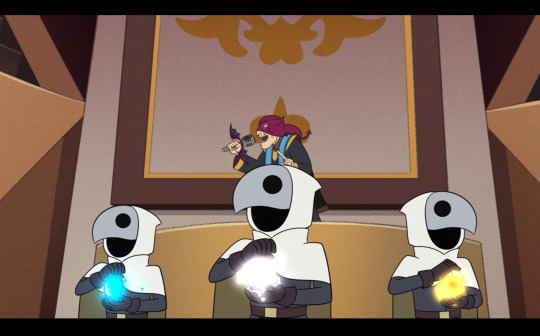
First up, let's establish some themes. The owl house is about freedom of expression. This should be pretty obvious. This episode goes out of its way to explicitly state this pretty early on, so you have that in the back of your mind.
"I get it Eda. Covens bad, individualism good. But I'm still figuring this world out. So, I'm going to go in there and make up my own mind."
There's a pervading attitude in specifically media analysis of "I'm going to throw a collection of big words at you to show how I am right" and the people that say this could be right, but they don't dwell on why. Knowing what something is called doesn't really do anything in something like this and reducing things to "Good" and "Bad" without explaining what that means is unhelpful.
To be clear, I'm not disagreeing with Eda here, the coven system is bad. And I'm not against big words (Half of my personality is an obnoxiously obscure vocabulary). But good and bad have no inherent, quantifiable definition. You have to define the parameters you are using. That's what this episode as a whole does. It explains, and it demonstrates.

Enough waffle. What are the covens?
Put simply, they are boxes to exist in. You align yourself with one idea and have to embody that idea for the rest of your life. It's restrictive, but that's not the selling point. The selling point is:
"Acceptance? Comradery? A sense of belonging? Covens sound incredible."
"Watch closely, Luz."
The coven system works on social rules. You want acceptance? You need to conform. And even the existence of the Tiniest Cat Coven backs this up. The Boiling isles don't care how you conform, they just care that you can be easily defined. Hence why they add labels to everything, including those outside of the covens. Eda is a "wild witch". Lus is "the human".
The sigil system is a pretty decent metaphor for this, in order to be accepted, you have to lose some of your magic, some of what makes you you.
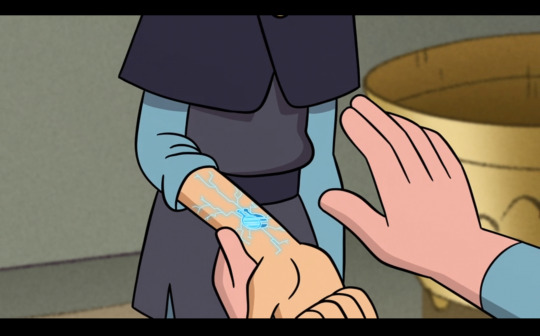
But there is one exception to this rule. The Emperor's coven. The best of the best can keep all of their magic. If you are good enough, you can keep some of your identity. But in exchange, you must wear a mask, disguise your face. It's conditional acceptance, and it's not acceptance of you, its acceptance of your abilities. Even Lilith is introduced wearing a mask.
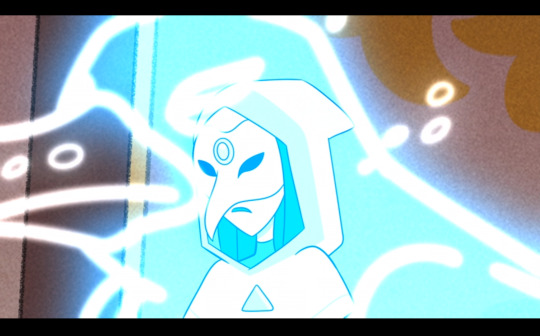
Now, one thing that struck me during this episode was how it makes a concerted effort to show how similar the Emperor's coven and the wild witches are. That way their differences are shown more dramatically. These begin superficial. Both can cast all kinds of magic, both have a Clawthorn as their leader, both back a child in what could probably be a life-or-death event. But then the similarities become more underlying. Both are impulsive and cheat their way to victory.
I said impulsive there, and I meant it. But you might be confused. Lilith doesn't strike most people as impulsive. But that is an act, a mask, you might say. She makes a concerted effort to be the holier than thou character, but it literally only takes a handful of rhymes to get her to act how Eda wants her to act. And remember the beginning of the episode? How does Luz convince Eda to let her go to the covention? With flowery language. There are some parallels here that are starting to get obnoxious.
So, what point am I getting at here? What are the differences between the wild witches and the Emperor's coven? The coven would lead you to believe that they are the only place where you can be accepted. But the wild witches provide that for each other, and they don't have to earn it. The answer, when you look closer, is freedom. In the Emperor's Coven, you are not free to be yourself, you give up your individuality, and your autonomy, which in my opinion, are not the kinds of things you want to relinquish.

Ok, I need to talk about this scene, because it's really cool. The key word here is acceptance. The reason Luz starts to break down Amity's walls is because she is kind. She doesn't call Amity to change her ways in some big monologue, she is just nice to her, and accepting. And that acceptance comes from a place Amity wasn't expecting it to. Amity has been raised to think that acceptance came from skill, that if you were good enough, people would be kind to you. That's why she's so hell bent on joining the Emperor's Coven. And yet here is Luz, after Amity had cheated, showing her dignity and respect.
Luz doesn't begin antagonistic towards the Covens, but the rivalry begins here. Luz is the opposite of the emperor, and by extension, the antithesis of the covens themselves.
Previous - Next
#rants#literary analysis#literature analysis#what's so special about...?#the owl house#toh amity#toh#toh luz#luz noceda#owl house#the owl lady
168 notes
·
View notes
Text
The Secret History Theories
I’m currently re-reading Donna Tartt’s The Secret History right now and I have several theories but no one to share them with, so I thought I would put them here to see what you all think!
Richard pushed Bunny.
Richard said he hates authors who skip over the grisly parts of their crimes out of shame/embarrassment/guilt but he does it.
He was not only involved in the planning of Bunny’s murder but encouraged it by telling Henry what Bunny told him about the farmers murder knowing that Henry was already thinking about killing him.
While he showed some guilt about the murder afterwards he had no qualms about going through with it and was involved in the planning of it every step of the way.
He had a vested interest in Bunny dying not just to help protect the group but because Bunny knew/implied he knew about Richard’s true background and that he was lying about having money. He would have wanted to keep his secrets. He also wanted to secure his place in the group and what better way to do so than to kill someone.
We don’t know how Bunny died, as Richard purposely skips over this information. The only thing we do know is that Henry walked towards him, Camilla checked to make sure Bunny was dead. But what exactly did Richard do? If Richard didn’t kill Bunny why wouldn’t he tell us how Bunny died?
2. Julian was more involved than Richard either was aware or wanted to admit.
I think he was the person Camilla remembered seeing at the Bacchanal. He and Henry had spoken before the Bacchanal and Julian had told him to do what was necessary.
Henry got the idea to do the Bacchanal from Julian. Henry and Francis both were interested in acquiring the land with Francis wanting to purchase the house and Henry finding the land sacred. Henry is implied to have spent more time with Julian than the others having been to his home and had private conversations.
He also calls Bunny by his nickname for the first time when it came to Bunny’s suicide note which was odd. He said he knew or was able to predict what his students were doing and with how close he was to Henry there’s no way he didn’t know what they were up to. Which is probably why he had to leave and did leave so quickly.
3. Richard was the author of Bunny’s suicide note as a confession. He spent a lot of time with Bunny and with Henry. He could have gotten the paper from either of them. The typewriter was in the study room for anyone to use.
Richard was an excellent student and could have written the note convincingly enough to sound like Bunny. It gives him the perfect out in the murder of the farmer because he’s not named once in them and it implicates the group especially Henry. Which could be Richards payback against Henry implicating him to the FBI. Also it’s the only way for Richard to confess just like he is confessing to us with the book for his guilt without having to actually atone for anything.
Richard also flip flops between insisting that Bunny was the author to it being possibly someone else. We also don’t know when the letter was dropped off because Julian doesn’t mention it. But from the way he was acting when he spoke to Richard and Francis and why he initially took it as a joke/brushed it off before speaking with Henry one could infer it was delivered after Bunny’s death.
4. Charles is the only other person who could have written the note because he was also close to Bunny and Richard notes he is an expert forger and the letter is one big middle finger to Henry and the only other person who had a reason to hate/implicate Henry as revenge besides Richard would be Charles.
5. Francis is a predator who was possibly abusing Charles and no one in the group seemed to care. He also tried to have sex/ SA Richard and foreshadowed doing it when he said “if you drank as much as he(Charles) does, I daresay I would have been in bed with you, too.”
6. A catamount killed the farmer, Henry lied about it so he could manipulate the group and to murder bunny.
There’s several hints about it being a big cat from Charles bite, to the way the body was found I mean how on earth did they rip open the stomach of a grown man and mutilate him without any weapons? They even go the catamount inn.
There would be something so deliciously ironic and really fulfill the themes of it being a Greek tragedy if it had all been a wild animal and Bunny was killed for nothing.
7. I think Richard was there at the Bacchanal and it was one of the many things he omitted.
He is a self professed liar, an excellent one at that. He has no problem going where he’s not supposed to as we saw him entering the room and calling the number to find out about the plane tickets Henry purchased. He was following the group around. It wouldn’t be a hard stretch that he followed them to the woods and saw the bacchanal/orgy.
He would have been upset he wasn’t invited because of his socioeconomic background. And upset that Bunny was invited over him.
Camilla thought she saw another person there. Henry thought he saw Dionysus there. Though it could have been Julian it could have also been Richard.
He admits he omits things and considered lying about Julian, he romanticizes Henry despite the murder, he easily went along with the murder of Bunny and has a thought of attacking and SAing Camilla and there is an implication he WAS lying about something very important. Which leads up to question what did he lie about?
He is not as horrified or concerned like a normal person would be when hearing your new friends just committed a brutal ritualistic murder. I think he was there, either as voyeur/bystander or he actually participated and was afraid Bunny might know or would find out which is why he goes along with it.
#the secret history#donna tartt#book theory#dark academia#henry winter#richard papen#camilla macaulay#charles macaulay#bunny corcoran#romantic academia#book lover#dark acadamia aesthetic#books#light academia#Academia#literature#literature analysis#dark academia books#dark academia vibes#Tsh#bookish#booklovers#literature academia#classics#classic academia#chaotic academia#academia aesthetic
174 notes
·
View notes
Note
Hi,
since I haven't seen anyone mention this on reddit or tumblr, I'd just like to say, as someone whose first language isn't english, Worm's cape names are fucking weird.
Are all of them words? Who knows, i read Worm and Ward without knowing Eidolon and Brandish are real words and not made up words.
Or they are words i know but idk wich meaning is? Is March like the month or like the organized walking verb?
So do all cape names mean something, and say something about the one who chose them? I refuse to google them at this point, but Anelace? Cinereal? Myrrdin? Couldn't they pick more known 2 word combinations? Do parahumans get a discount on thesaurus?
Thats all I wanted to say, thanks.
PS. Wildbow, the fuck you doing using Califa de Perro as a name, couldn't you ask any Spanish speaker?, i'll kill you.
BIG ANALYSIS INCOMING
Eidolon = spectre, phantom, and idolized object/person
Brandish = to flourish and wave about an item, usually a weapon. Also an epitaph for Athena
March = to move in a uniform manner and derivative of the roman god of war, Mars
Anelace = double-sided dagger used by civilians
Cinereal = grey matter of the brain and nervous system
Myrrdin = Too many to count but generally tied to Myrddin Wylt, prophetic folklore bard and a facet of Merlin (genuinely more work than I can ever give on the topic of how insanely intertwined those myths are)
The thing about Wildbow's cape names are two-fold:
In the 80+ years of superhero genre, a LOT of cape names have been chosen and used already. Taylor mentions this to Armsmaster as a meta-joke in the first arc (ironically, DC also has a Skitter, who debuted in 2011.... the same year as Worm), so he has to be creative and sometimes creativity is simplicity.
He loves giving character names multiple meanings.
To go down the list:
Eidolon's name is ironic, because he notably not idolized (and pushed out of the spotlight compared to Legend), and he ends up becoming one of GU's spectres.
Brandish creates weapons, yes, but there's connection to Pallas (brandishing) and Athena accidentally killing him while distracted to Victoria accidentally caving her head in while distracted. (There are several story iterations, including one where they had a parental relationship).
March is about how she organizes her megacluster like an army or marching band, but also reference to her civilian name (May), the Mad March Hare from Alice in Wonderland (which her entire fight with Vista is a huge reference to), and the Ides of March (notorious for the stabby stab stab of Julius Caesar)
Anelace is a master of weapons, but he's notably reluctant about that fact, and is noted to have a healthy civilian life by other characters
Cinereal is the grey matter of the brain. She is the Atlanta Protectorate leader that turns things into grey matter (ash)
Myrddin = See the King Arthur and various clusterfuck of mythos
Even his main characters have this: Taylor tailor makes her outfits and is a silk Weaver, Khepri is an Egyptian god that bring a sunny morning... and she debuted on Gold Morning. Victoria is a Roman Goddess of Victory (Contessa uses her to find "the Path to Victory"), Antares means "Anti-Ares/Rival of Ares/Anti-War" and is the constellation "heart of the scorpion" which is Victoria inside of the wretched forcefield.
We can even stretch this to Khepri and Antares: Khepri is a beetle that carries the sun on to a new day. Antares is a binary sun system (with one sun being invisible to the naked eye). In the slaughterhouse 9 fight, Taylor and her beetle (khepri) carry Victoria and the fragile one (antares) to safety (to live another day).
WE CAN EVEN GO FURTHER: Atlas is the man holding up the sky in Greek Mythology, which Taylor names her beetle. Victoria's PHO name is Point_Me_@_The_Sky (which is also a Pink Floyd reference). In Worm, Atlas holds Victoria up in the sky.
Its really fun to analyze.
Califa seems to be a simple goof. Or maybe Taylor just butchered his name.
They can't all be winners.
#parahumans#wildbow#ward#ward web serial#wardblr#worm#victoria dallon#antares#glory girl#worm web serial#wormblr#taylor hebert#skitter#weaver#literature analysis
87 notes
·
View notes
Text
i'm like if a hot girl was both Frankenstein and his monster at the same time
#frankenstein#frankenstiensmonster#dark academia#chaos academia#dark acadamia quotes#grunge academia#goblin academia#light academia#academia aesthetic#study aesthetic#university#academia quotes#literature#mary shelley#mary shelly's frankenstein#english literature#literature analysis#cryptid#cryptidcore#goblincore#dark cottagecore#explaining myself is not in the narrative sorry loves
76 notes
·
View notes
Text
One of the things I adore about Bungo Stray dogs is how it challenges our ideas about what a “main character” is. Atsushi is undeniably the protagonist, the story begins when his hero’s journey begins and follows it. It somehow manages to fit the hero’s journey perfectly and challenge it at the the same time by simply expanding the scope of the audience’s perspective. Atsushi is the protagonist and we watch every part of his hero’s journey unfold, but we also get immense insight into the mentor/shapeshifter’s backstory and plots.
It’s like if the Harry Potter books followed both Harry and Dumbledore from the beginning, with flashbacks to Dumbledore’s past. If that happened Harry would become, in the reader’s eyes, a piece on Dumbledore’s chessboard because we would see all his machinations from the beginning. That’s exactly what happens in BSD with Dazai. Instead of us seeing Atsushi as the main character who everything revolves around we see Dazai as the mastermind who shapes all the events of the story around Atsushi. Instead of seeing Dazai as a mysterious mentor figure with a dark past shrouded in mystery that gives Dazai wisdom of experience we see him as a flawed person with dubious morals who is trying to be good but doesn’t know how, someone who’s been hurt terribly and hurt others even worse. In turn, Atsushi’s character appears more naive and pathetic, his accomplishments and growth don’t seem like his so much as Dazai’s. He behaved exactly as Dazai anticipated because Dazai manipulated him and the situation for that to happen. It makes Atsushi a tool for Dazai, makes his accomplishments Dazai’s. But if the story was told to us omitting all of Dazai’s behind the scenes manipulations Atsushi would feel like any other protagonist. Dazai would feel like Dumbledore, helping from the shadows rather than pulling strings from them.
Anyway, I’m a lit nerd if you can’t tell and I think Asagiri is a genius.
#bsd#bungou stray dogs#analysis#anime#me nerding out#literature analysis#bsd atsushi#atsushi nakajima#bsd dazai#dazai osamu#harry potter references#bungo stray dogs is a literary masterpiece#argue with the wall#the hero’s journey
36 notes
·
View notes
Text
As promised to @maidofdarkness23, here is the first of several breakdowns on the villains of Skulduggery Pleasant.
The Villains of Skulduggery Pleasant
We start at the beginning, in Phase 1, Book 1 (which doesnt have a subname as far as I know, its only titled Skulduggery Pleasant).
Ready?
Nefarian Serpine
Certified best villain ever (I am not biased).
Alright, so first of all:
We are talking about Book 1, the beginning of the series and a book that (in comparison to all the others) is still working with a world that hasnt been established, ideas that arent entirely fixed yet and vibes that are still a little different.
Nefarian Serpine - for all his flaws - embodies this hard. He is almost larger than life in the first book, a reputation that he doesnt really hold in his other Leibnitz dimension appearances. In comparison to every other villain of the week, he lives in an ellaborate, gothic castle filled with hollow papermen and everytime the castle is described, the accompanying thunder and dark clouds are implied.
He never has much screentime, but Dereks perspective style writing lends him just enough depth that his cartoonishness turns sinister and plotting. His interactions with Bliss showcase a man that is deeply aware of his wrongdoings and yet consistently smiles into the face of distrust and hatred. This man knows how to play the game. He is too sure of himself, which makes reading about his movements and actions so full of dread. The question is not only "What has he done in his past?" but the much worse question of "What is he actually doing right now?"
How far will he go, surrounded in his castle by papermen, alone, twirling a wine glass.
In essence, Serpine is a silly villain, so cladden in clichés and stereotype that he is almost larger than the sum of his parts. His shadow is bigger than his body.
The first book establishes that he alone is the reason for Skulduggery Pleasants misery, loss of wife and child, as well as skin and body. A traumatic position that (afaik) no other villain even so much as came close to. The stakes are - of course - world saving level, but they also hold a personal pain that very few following villains in Phase 1 come close to.
In terms of atrocities commited against Skulduggery, hes probably second to none. Even China just followed his lead and never actually plotted or - worse - put them into motion.
The interest in most other villains comes down to
A) saving the world.
B) some kind of moral or ethical conundrum about the world of sorcerers.
But very rarely
C) literally facing the root of your trauma (for Skulduggery) or establishing a root (for Valkyrie).
(Quick Sidenote: Serpines death signifies both Skulduggeries "closure" with his old self and Valkyries acceptance of her new self. Once again, Serpine is not only a foil but also a catalyst).
It is also a great setup to reveal Skulduggerys less heroic sides: His wrath and his care for Valkyrie and Valkyrie alone. The two things that would, throughout the whole series, stay consistent.
Serpine is foil to Skulduggery in even more ways than that, revealing that the same cocksureness and self importance is an incredibly annoying feat in literally anyone else. Going up against Skulduggery must be infuriating, because going up against Serpine definitely is.
And hes also funny.
Have I mentioned how fucking funny Serpine is? Wanting to turn Skulduggery into a piano, absolutely able to hold his wit against the onslaught of insults and quibs exchanged.
Its also important to distinguish this Serpine from the Leibnitz Serpine. His Leibnitz equivalent foils a Skulduggery and Valkyrie that are much further along on their way to madness - he acts just enough like his original (after all, its only been like, what... Six? Seven? books?) but there are still some differences. I'll get to that. Someday.
Back to OG Serpine.
What do we have so far?
Serpine is an almost cartoonish assortment of tropes (the hand, the castle, the general vibe) but somehow, it works. Hes just a little "more" than his tropes, alluding to a three dimensionality he doesnt actually posess, but we have enough to believe it to be there.
He is clearly a product of the series not being established, which explains his constant later downplays (him being the weakest between Vengous, Vile and Serpine for example is only established long after Vengous and Serpine are dead).
He is the most personal villain that the Duo - and especially Skulduggery - face and its hilarious, that its literally the first book.
He is in so many ways exactly like Skulduggery. Full of himself, magically skilled beyond sense, insane (Im looking at you, Faceless Ones Dimension), obsessed with his own aesthatics, also literally a former Mevolent Higherup/Endboss/what do you even call that, witty, sarcastic, smart and able to plot etc. Etc.
He is both the door finally closing for Skulduggery and the door being blasted open for Valkyrie.
We'll come back to him, dont worry. His weirdass villain castle is used by Scarab and Billy-Ray in another book and he plays a passive role even after his death (like the opinions of the Dead Men, China Sorrows trauma, etc.) and even an active role as his Leibnitz replacement.
Solid 10/10 villain.
Im sorry that this got so long and I hope it made any sense and/or provided new insight to literally anyone.
I wrote more of this:
Heres Part 2 with Baron Vengous and heres Part 3 with Batu.
#skulduggery pleasant#nefarian serpine#character analysis#literature analysis#wow thats a lot of words#I hope this makes any sense#have a great day!#SP Villains
88 notes
·
View notes